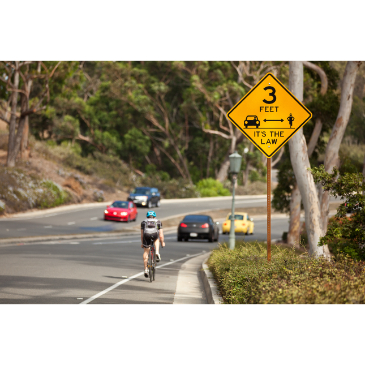Driving is a daily activity that most people take for granted. Because people are so familiar with driving, they rarely give it their full attention. In fact, many people are distracted drivers — texting, making phone calls, or reading emails as they drive. While the topic of distracted driving is often discussed, there are other rules of the road that people are either unfamiliar with or discount altogether. Two of these, in particular, are the 3-feet rule and the Move Over Law.
 The 3-feet rule and the Move Over Law are intended to protect both drivers and those who may be legally on the road in a different form or fashion. The 3-feet rule applies to drivers giving cyclists at least 3 feet of space when passing. The Move Over Law requires drivers to change lanes (when safe) or slow down for emergency and utility vehicles.
The 3-feet rule and the Move Over Law are intended to protect both drivers and those who may be legally on the road in a different form or fashion. The 3-feet rule applies to drivers giving cyclists at least 3 feet of space when passing. The Move Over Law requires drivers to change lanes (when safe) or slow down for emergency and utility vehicles.
The 3-feet rule is designed to protect cyclists from potential impacts with vehicles. While many drivers dislike the law and believe that it favors cyclists, people on bikes are not without responsibility. When cycling, riders should be as close to the white line as possible. If they are in groups, they should ride single file and not out in the middle of the lane. As for vehicles, they are to remain at least 3 feet away from cyclists when following or passing. The intent of this law is to prevent a fatal interaction between a car and a bike rider. In Tennessee, a bike is recognized as a vehicle and is afforded the same rights and protections as a car. Violations of the 3-feet rule can result in a Class A or B misdemeanor based on the severity of the injury the cyclist suffers. Violations may also cost between $250 and $500 and result in the loss of a driver’s license for 6 months to 1 year.
The Move Over Law is designed to protect emergency personnel responding to an accident, police officers issuing tickets, or utility service personnel performing work. Drivers who fail to move over to an adjacent lane, when safe, or slow down can be cited. The citation can include a maximum fine of up to $500 and possibly up to 30 days in jail. If you see an emergency vehicle or utility service vehicle and do not pull over or slow down, you very well may risk getting a ticket.
If you have been cited for violation of the 3-feet rule or the Move Over Law, you should not attempt to dispute the charge yourself. This is particularly true if an injury has occurred as a direct result of the violation. Contact Best and Brock to receive proper legal counsel and assistance. For more information, contact us today!
